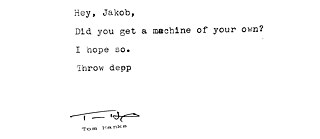Der Reiz des Analogen
The Typewriter
Auf der Suche nach einer Alternative zur beinahe erdrückenden Effizienz des Digitalen, stößt Jakob Lewis auf die ‚Typosphere‘, eine Online-Community für Menschen, die Schreibmaschinen nicht nur sammeln, sondern auch begeistert darauf schreiben. Nachdem er mehrere Schreibmaschinen erstanden und auf einer davon auch einen Brief an Tom Hanks geschrieben hat, ist Jakob inzwischen völlig zum analogen Verfassen von Texten übergewechselt.
Diese Folge anhören: Apple Music | Spotify | Download
Diese Folge stammt von Jakob Lewis, Kreativdirektor bei Great Feeling Studios in Nashville, Tennessee. Jakob kommt in Deutschland zur Welt, als sein Vater dort mit der US Army stationiert ist. Obwohl die Familie in die USA zurückkehrt als Jakob noch ein Kleinkind ist, bleibt er Deutschland und seiner Kultur auch weiterhin persönlich verbunden. Als er sich für diesen Beitrag intensiver mit seinem Hobby, dem Sammeln historischer Schreibmaschinen beschäftigt, entdeckt er eine ungeahnte Verbindung nach Deutschland. Die Musik zur Folge stammt von Blue Dot Sessions. Das Foto zum Beitrag zeigt einen Brief, den Jakob vom Schauspieler Tom Hanks erhielt, ebenfalls überzeugter Anhänger des analog getippten Wortes. Mehr zu erfahren über seine Verbindungen nach Deutschland gibt es in Jakobs Folgen: „My Pen Pal“, „The Garden“, „Finding My Parents“ und „What’s a Sister City Really?“ Die Folge „My Pen Pal“ ist auch in einer deutschsprachigen Version verfügbar.
Transkript
[TYPEWRITER SOUNDS]
Jakob Lewis: I’m in a small typewriter store in Goodlettsville, Tennessee, outside of Nashville. I’m sitting at a vintage round table surrounded by a veritable who’s who of typewriters through the years. Classic models from the ’40s, ’50s, ’60s, and so on. I’m banging away on a snappy Olympia SM3. The Cadillac of manual typewriters. I pause to consider my next few words, and the shop owner couldn’t help but chime in.
Kirk Jackson: That hesitation, that pause. That is why I love typewriters, you know? ’Cause like on a computer you’d still just be like a backspace, you know, like whatever. On a typewriter, you’re like, what am I trying to say?
Jakob Lewis: Kirk Jackson has put out a handful of Olympia typewriters for me to try out today. Western German-made machines of excellence. Kirk is in his 40s, he has real intense eyes, and is wearing a craftsmen apron to protect his clothes as he cleans and repairs these gizmos. On a small table behind me, he’s set out a tray with paper, envelopes, and stamps. So while I was testing out these machines, it was only natural to use the opportunity to write a letter to someone. [READING ALOUD] Dear Tom. Dear Tom — that’s how my letter starts because this letter is to Tom Hanks. Yeah, the Tom Hanks. Now, this is not really what this story is about, but he is America’s most well-known typewriter enthusiast. He has a collection of several hundred typers. He even wrote a book of short stories all centering around the machines. The online community of typewriter enthusiasts known as the ‘typosphere.’ Yes, the typosphere. Well, they all swear that he’ll write you back if you write him on a typewriter, but of course, a peasant civilian like myself had to get his address. Now, there’s fan mail addresses online and one for his publicist. But for the real deal? You have to know a guy in the typosphere.
Kirk Jackson: I have the address, so ...
Jakob Lewis: Bingo! So, I got to the joyful tactile labor of love that is typing on a manual typewriter, free from the trappings of the digital world. How do you spell Goodlettsville?
Kirk Jackson: G-O-O-D-L-E —
Jakob Lewis: L-E?
Kirk Jackson: L-E-T-T —
Jakob Lewis: E-S?
Kirk Jackson: E-S-V-I-L-L-E.
Jakob Lewis: [READING ALOUD] Dear Tom. I’m a ... Dear Tom, I’m a radio producer doing a piece on typewriters sitting here in Kirk Jackson’s new shop in Goodlettsville called Nashville Typewriter. I’m making a piece for the Goethe-Institut about Olympia typewriters. So, I’m writing you from an SM3. We just got done talking about how typewriters tie stories to an actual object and that these objects are becoming scarce. And where there is scarcity, there is need. And where there is need, community starts to form. Typewriters create community, and I’m glad to be a part of that. We could all use a little more quality interdependence and a little less shallow independence. Kirk says hi. [LAUGHS] Sincerely, Jakob Lewis.
Kirk Jackson: That’s awesome. [LAUGHTER] That’s really awesome.
Jakob Lewis: I’m just gonna leave it in your hands and see if the universe ...
Kirk Jackson: Yeah, man, I’ll send it out. I need your writing one anyway, he actually — I’ve written him letting him know that I was opening the store, and I didn’t hear back from him, so ...
Jakob Lewis: So, if you would have told me a year ago that I would be obsessed with typewriters and be writing a letter to Tom Hanks, I would have just scratched my head ... But now, I’m swimming in the things, and a typewritten letter is en route to Forrest Gump himself. So, how did I get here? Well, it has to do with this thing Kirk just said. Let’s rewind.
Kirk Jackson: That hesitation, that pause. That is why I love typewriters, you know? ’Cause like on a computer you’d still just be like a backspace, you know, like whatever. On a typewriter, you’re like, what am I trying to say?
Jakob Lewis: That hesitation. That pause. What am I trying to say? [BATHWATER RUNNING] Well, my typewriter journey started with a pause. It started in the bathtub. You see, I was tired and needed to relax. At the time, I had a two-year-old son and another arriving any day. I also run my own podcasting company. And I just needed 30 minutes of non-work, non-family time. I needed to stop, and I just wanted to be alone. But the problem was, when I was alone, I would just be on my phone. My life had no space, I was going from stimulus to stimulus. Like at night, my wife and I would finally get our son down for bed, and we’d have the opportunity to be together. Yet, it was a race to turn on Netflix as fast as possible. Not to connect, but to zone out. From each other, from ourselves. And when I actually had to do work online, like every day, the constant assault of information had my head spinning. Add in the COVID time warp mindfreak that we’ve all experienced, and I was a shell. [MUSIC] I desperately needed to hesitate, to pause. To figure out what I was trying to say. So, amidst Epsom salts and scalding hot water on a Sunday morning, I opened up my local newspaper, The Tennessean. I subscribed a couple of years ago out of a similar desire. But the truth is, I hadn’t read it in a while. I mostly just used it to keep my kids’ craft messes off the dining room table. A peculiar column caught my attention, though. It was called “The Type Set” by Keith Sharon.
Keith Sharon: Dear Reader ...
Jakob Lewis: There’s a video about it on The Tennessean’s website:
Keith Sharon: I have this old typewriter, a Smith Corona 88, named for the number of characters it can type. And I got this idea: I wonder if I write letters to people — and it could be anybody — would they write me back?
Jakob Lewis: He would write letters to people on his typewriter, and they would write back. Keith would write articles about his correspondence. [MUSIC] In the bathtub, that day’s story was about our very own local typewriter repairman Kirk Jackson — with the intense eyes. At that point, I’d never met Kirk or even heard about him before. But Kirk had recently received national attention because, not only does he have Tom’s address, he actually got an in-person visit from the patron saint of typewriters himself. Tom showed up one day. He tried out old typewriters in Kirk’s barn, talked for an hour at the kitchen table with Kirk’s family. He ended up buying two machines. It was a good column. Just some ordinary delight amidst articles about racism, book-banning, war, and death. I set the paper aside. And it was there in that brief moment of stopping that I was struck with an ailment that’s known as the ‘Hanks Effect.’ That’s right, those in the typosphere refer to this sudden urge to simplify life and get a manual typewriter as the Hanks Effect. And that’s when — ironically — in the tub, I reached for my phone. I looked up to see who was selling typewriters. Turns out, a good one is pretty expensive, so I texted a handful of friends to see if they had an old typewriter laying around in an attic or something. My friend Nikki wrote back and said she had one I could borrow. There was a date set for me to pick it up. The Hanks Effect had started its terminal course. But even in my moment of lucidity and stopping, once my phone was in my hand, I stayed on it in the bathtub till my arm hurt, and I got all pruny. [MUSIC] And why do we need typewriters today?
Richard Polt: Because of computers. Because computers are everywhere, and we ain’t seen nothin’ yet.
Jakob Lewis: This is Richard Polt, philosophy professor at Xavier University.
Richard Polt: And I’m a typewriter nut.
Jakob Lewis: Richard has written an awesome and very physically beautiful book called The Typewriter Revolution and has a blog that he literally writes mostly on a typewriter, then scans into his computer, and shares online. What would your argument be to somebody who’s just pointing out the mad inefficiency of this process?
Richard Polt: Well, I would say that the best things in life are not efficient. I mean, if you efficiently kiss somebody, you’re a pretty bad kisser, right? [LAUGHTER] You don’t efficiently drink a glass of wine unless you’re an alcoholic. The best things in life are ends in themselves and not just means to an end. So, writing can also be an end in itself.
Jakob Lewis: Polt sees the typewriter as a tool for the good life. And also as a weapon to fight back against things that inhibit the good life like the digital takeover of our world.
Richard Polt: We are increasingly aware of the threats to privacy, to concentration. To standards of truth even, all sorts of negative effects of our addiction to digital technology. So, I think people, just as computers keep growing, will keep looking for analog tools just as a break from the norm. You can produce a lot with digital technology, but you also develop a scattered mind.
Jakob Lewis: A similar sentiment comes up in the documentary The Social Dilemma, talking about how the addiction aspect of social media and our phones is because they go well out of the bounds of a tool. A bike is a tool. If you want to ride it, you get on it and pedal. But when it’s put away in your garage, it doesn’t beep to remind you to ride it or alert you when your friends are riding or try to use your riding as a means to sell you something or learn something about you. Although, who am I kidding? I bet there are bikes out there that do that right now. But I’m talking like a dumb bike. It just sits there until you’re ready to use it again. So, prompted by a growing rebellious spirit, one day Richard started typing up a manifesto, a typewriter manifesto. It’s essentially aimed against our digital world. He scanned it, put it on his blog, and invited others to retype it out, and share it. Slowly, people all around the world began typing it out and translating it into all sorts of languages. You see, if you’re going to get into typewriters — and why wouldn’t you — when you start googling around, Richard Polt is kind of the epicenter of the cult. So, for those who have come down with the Hanks Effect, this manifesto serves essentially as a creed for the insider. Those really in the cult type it out. It reads as follows: [READING ALOUD] We assert our right to resist the paradigm, to rebel against the information regime, to escape the data stream. We strike a blow for self-reliance, privacy, and coherence against dependency, surveillance, and disintegration. We affirm the written word and written thought against multimedia, multitasking, and the meme. We choose the real over representation, the physical over the digital, the durable over the unsustainable, the self-sufficient over the efficient. The revolution will be typewritten. The problem was for me: I didn’t have a typewriter yet. So, I went to the front stoop of my friend Nikki’s house to pick up my weapon and join the revolution. It was a Smith Corona Super Silent. A blue beautiful typer that has a very classic look to it: three blue stripes on the top and a chic leather carrying case. This is what it sounds like. [TYPEWRITER KEY SOUNDS] Here’s the bell. [TYPEWRITER BELL] There’s a soft cushy touch to the keys and a very ratchety carriage return. I took it home and started typing. It had an old ink ribbon that was dried out. I quickly looked up ribbons and, turns out, you can order basic ones on Amazon. So when I got fresh ink, things started happening. I wrote my best friend from college, I wrote my grandparents, I wrote my German pen pal. I typed out the typewriter manifesto and hung it above my desk. From there I wrote poetry and songs and to-do lists and nonsense. I just wanted to hit the keys. It was getting me to slow down and reconnect with myself. But sometimes, it was also frustrating. The keys would get stuck. The thing wouldn’t always work right. So, I took to YouTube.
Duane Jensen: Going here: Phoenixtypewriter.com. Got this mid-1950s Smith Corona Silent. Here.
Jakob Lewis: There are hundreds of videos online of white men teaching you how to repair typewriters.
Duane Jensen: So, just wanna highlight what we do, or what I do, when we recondition these.
Jakob Lewis: There was something soothing about these videos to me, almost like ASMR videos. I devoured them. I learned about all the parts of a typewriter. The platen, or rubber roller that feeds the paper. The carriage, that thing that goes from left to right and that you return with the carriage return lever. I learned that many old typewriters didn’t have the number one because they wanted to be economical with the keyboard, so you were supposed to just type a lowercase “L” if you wanted the number 1. Same with an exclamation point. Just type an apostrophe, then backspace, and type a period. Bingo bango: an exclamation point! As I learned how to do these very basic repairs, the rabbit hole commenced. Smith Corona and this model in particular — the Super Silent — was actually pretty awesome, but the world of typewriters is vast. Smith Coronas, Remingtons, Royals. Those are American brands. Olivetti, which are pretty top-notch and uniquely sexy machines, are Italian. But the real pinnacle? They’re German-made machines from the ’40s and ’50s.
Richard Polt: Well, Torpedo is one very good brand.
Jakob Lewis: Richard Polt again.
Richard Polt: I have an Adler Standard from 1938. And then, there’s Olympia, which is widely called the best typewriter.
Jakob Lewis: Olympia. A brand made in western Germany.
Richard Polt: I did talk to a 94-year-old typewriter repairman in New Haven, Connecticut, shortly before he passed away a few years ago. And I asked him, what are the best typewriters, you know, given your 70 years of experience, and he said Olympia, period. There’s a very good book here. It’s a two-volume work by Leonhard Dingwerth called Die Geschichte der deutschen Schreibmaschinen-Fabriken — a history of German typewriter factories.
Jakob Lewis: Oh my gosh.
Richard Polt: Yeah, Dingwerth was a very excellent typewriter historian who put out a lot of books, and the section on Olympia goes on for many pages. So, the name Olympia didn’t come along until 1930.
Jakob Lewis: Essentially, the story of Olympia is this: They were originally called AEG — the General Electric of Germany, light bulbs, electric motors, that kind of thing. And around 1900, 1900, they wanted to make an electric typewriter. Something that was actually happening in America, where typewriters were really coming into mainstream success.
Richard Polt: So, this German project for an electric typewriter didn’t come to fruition right away, but they did come out with a little index typewriter called the Mignon.
Jakob Lewis: Mignon. Now, this bizarre little machine is so cool. I got to use one in Kirk’s shop.
Kirk Jackson: So, this is actually the Mignon here. Yeah. And yeah so, it is that pointer typewriter, and you basically hold this little disc ...
Jakob Lewis: The Mignon looks like this — on the left: a golden soap dish looking-thing with letters on it, above it: a little pencil-looking thing on a pendulum. Kind of like an old sewing machine meets the worst claw machine ever. And it kind of feels like an Ouija board or something like ... Can I, can I? So, I’m moving this pendulum ... Oh, it actually touches the surface. And if I point it to a little ... Get it in that “S” zone, it is attached to an arm, and it turns this little cylinder. Once you point this pointer at a letter, it’s connected to a bunch of rods and rotates a cylinder that has all of the characters possible on it. When you press the machine’s one key, it imprints a letter on a piece of paper. Wildly inefficient but still a pretty remarkable design.
Richard Polt: This is probably the fastest and best index typewriter ever invented. Then, they followed up with a full-sized standard keyboard typewriter that was called the AEG. And then in 1930, they called it the Olympia.
Jakob Lewis: Now, Olympia made some amazing typewriters during this era. But then along came World War II, and something rather interesting when thinking about typewriters as a form of resistance. Germany was split up into East and West. The factory had been located in eastern Germany and was taken over by the Soviets, but folks with typewriter schematics escaped and founded an Olympia factory in western Germany.
Richard Polt: So, there were actually rival Olympians for several years, in Erfurt in East Germany and Wilhelmshaven in West Germany.
Jakob Lewis: Until along came an international court case and settled it.
Richard Polt: The West Germans won the right to use the Olympia name. So, the East German machine was rechristened the Optima.
Jakob Lewis: These machines are almost identical — the Olympias of western Germany and Optimas of eastern Germany. Now, both factories kept plugging away through the decades. The western Germany one made it to 1994 before shuttering its doors, and if you can believe it, the eastern German typewriter factory kept going until 2004.
Richard Polt: Still in the 21st century, the East German factory was producing typewriters. According to Dingwerth, around 10,000 to 12,000 typewriters a year. Despite the fact that the computer age was upon us at that point.
Jakob Lewis: So naturally, I wanted an Olympia. I wanted to start at the top of the typewriter mountain. I was still typing all the time, but surely, an Olympia would heighten the romance. But the thing was, with two kids, a business, and being the sole breadwinner, I didn’t feel I could exactly justify this rather expensive new hobby of mine. You see, a restored Olympia can be rather pricey.
Richard Polt: Might cost $500.
Jakob Lewis: So, I started scouring Facebook Marketplace for folks who hopefully found something in their attic, thought it was junk, and didn’t really know what they had. And boy, did I certainly find that but not in the way you might think. [MUSIC] The first promising cheap item that popped up was a Smith Corona Sterling for $15. Not an Olympia, but $15 was too good to pass up. And the process of getting this typewriter kind of changed me. You see, I hadn’t been on many solo adventures during the pandemic. I was pretty used to holing up in my office and interacting with everyone digitally. But this transaction — it was the kind of real-world interaction that just can’t happen online. I mentioned the story to Kirk at his typewriter store. I told him that I set up a meeting with this person selling the typewriter. And I show up in West Nashville, and they’re like, let’s meet in this Waffle House parking lot. And I was like, okay. And I get there, and this person shows up on a bike, holding a typewriter, like just holding it. And the case won’t latch, and it’s like in rough, really rough shape, but I’m like, 15 bucks. I don’t know, it’s a project. But I get it in, and I do the exchange. No, I didn’t even, it wasn’t even $15. I traded him two moped helmets. That’s what it was. So, he gets the moped helmets, but here’s the kicker: I close the back of the car, and I see this person meet up with this woman, and they ride across the street and get in a tent with a bunch of shopping carts. So, this was a person who was experiencing homelessness, who had been holding onto this typewriter. And he’s like, I’m just glad somebody can use it. And I was like, I’m just glad somebody can use these helmets, you know? [MUSIC] It was a curious mystery, the story behind this typewriter. But the experience endeared me to the machine. I took the battered seafoam green Smith Corona Sterling home. I tested my newfound YouTube skills and cleaned the machine inside and out. It’s possible this sat outside in the rain for a long time, who knows, but after a little love, this thing was typing again. Now, this style of this model was manufactured in 1949. That’s almost three-quarters of a century ago. And it still just works. Here’s what it sounds like. Alright, this is a Smith Corona Sterling. The Sterling. [TYPEWRITER SOUNDS] This typewriter gave me hope that with a little time, work, and attention, anything can be recovered. But then, the Hanks Effect started to get slightly out of hand. I continued to scour Facebook Marketplace. I got a Royal Safari and an Adler J-5. And then, I saw it: an Olympia for $15. No helmets involved this time. Now, in the most simple terms, there are two types of typewriters: There are desktops or standards, and there are portables. Portables usually have a carrying case and are lighter. But a desktop is a honker, these are the stalwarts of secretary work. Machines that could write all day, every day for a century. The Olympia SG1 is one of those honkers. I didn’t know just how big until I showed up. It was like a ’90s microwave with a bowling ball in it. I almost got a hernia lifting it, but when I took it home and started typing, it was glorious. I took it when I went to see Kirk in his shop. He had another SG1 just like it to show me that had a unique font.
Kirk Jackson: That’s one of my faves.
Jakob Lewis: I like the ...
Kirk Jackson: Yeah, the font.
Jakob Lewis: Yeah, the type is really cool.
Kirk Jackson: Yeah so, that is one aspect other than the snappiness. I just like the feel of it. The font on this is what’s known as ...
Jakob Lewis: I was really hoping that Kirk would be open to a trade because that SG1 was a beast, and I was looking for something smaller. But when he told me that the SG1 was absolutely one of his favorite machines ... And having gotten it for only $15, I just gave it to him. But he said he would return the favor one day. Kirk and I had a glorious morning together. He let me type on a typewriter that Tom Hanks had typed on. A Smith Corona Skywriter, if you’re curious. Kirk and I exchanged a surprising number of stories about the strange fruit that had come into our lives because of these stupid machines. And I realized, something had changed in me. Originally, I wanted a typewriter to stop. To be alone. But turns out, I really wanted a typewriter for what came out of that. I wanted to stop, so I could find myself again and reach out to the world from an integrated and connected place. And it was from that place that I wrote Tom Hanks. No, I haven’t heard from him yet, but perhaps he’s pausing, hesitating, and figuring out what he’s trying to say.
Jakob Lewis: Yeah, what is this thing right here?
Oscar Lewis: I’m just typing it.
Jakob Lewis: Just typing it? What’s it called? As for me, since the newspaper in the bathtub, I went from having one son to two. And these days, I have a lot more to give them. And I’m passing along my love for these inefficient archaic machines. So, Oscar, do you like typewriters?
Oscar Lewis: Yeah! I do!
[TYPEWRITER SOUNDS]
Oscar Lewis: I did it!
Jakob Lewis: Alright!
[CHILD CHATTERING IN THE DISTANCE]







